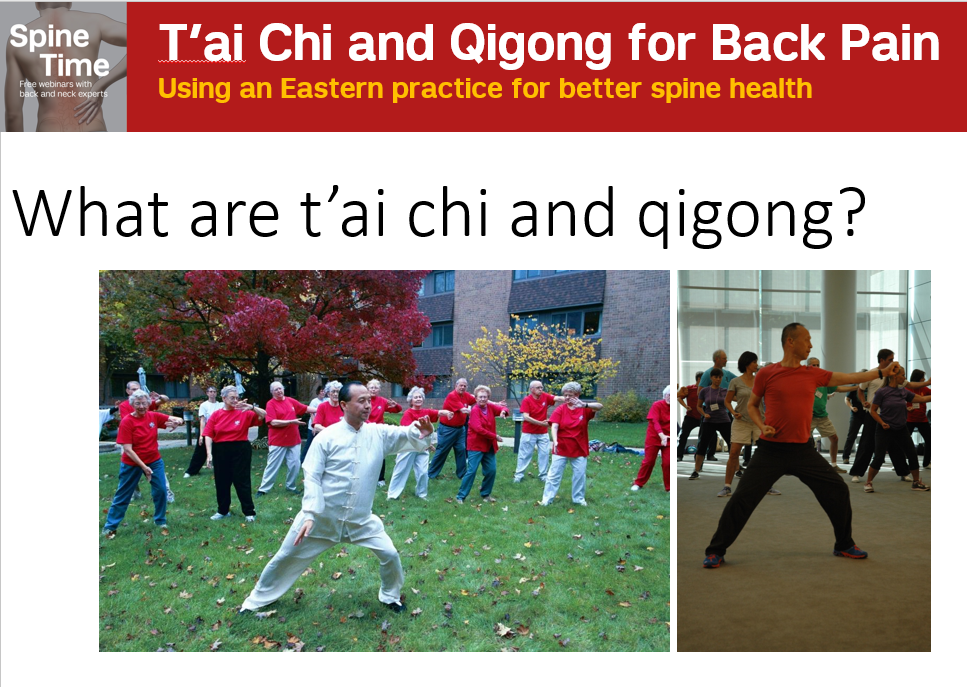
A new study published in the North American Spine Society Journal reports that an online program of t’ai chi, qigong, and meditation may be helpful in reducing lower back pain. The randomized clinical study, which was jointly conducted by Och Spine at NewYork-Presbyterian/Weill Cornell Medicine Center, the Center for Taiji & Qigong Studies, and New York Medical College, found that patients who attended online classes for twelve weeks reported less pain, easier movement, better sleep, and improved quality of life after participating in the program.
“Back pain is one of the most frequent reasons for disability and suffering in our population,” says Roger Härtl, MD, the senior author on the paper. Dr. Härtl is the Hansen-MacDonald Professor of Neurological Surgery and Director of Neurosurgery Spine at Weill Cornell Medicine and is also the founder and director of Och Spine at NewYork-Presbyterian at the Weill Cornell Medicine Center for Comprehensive Spine Care. “As a spine surgeon,” he adds, “it has always been my goal to limit the use of spinal surgery to those patients who will really benefit from a surgical intervention. This study expands our spectrum of patients who don’t need surgery and those who may eventually benefit from a surgical intervention.”
“It’s well established that t’ai chi and qigong help to reduce pain and to improve strength, balance, immune function, sleep and mood,” says tai chi grandmaster Yang Yang, PhD, founder and director of the Center for Taiji and Qigong Studies in New York. “Our new research shows how modern tools—virtual classes streamed on Zoom—are an effective way to deliver these ancient practices and to realize their health benefits.”
Master Yang Yang was a popular guest on the webinar series Spine Time, which was presented during the pandemic to provide ongoing information and support to those with back pain. A recording of that episode has had thousands of downloads since the webinar. More than 70 recorded episodes of the SpineTime series are available on YouTube.
Participants in the study, all of whom suffered from lower back pain, attended twice-weekly, hour-long online classes that focused on meditation practices and on gentle movements aimed at increasing relaxation, spinal flexibility, posture, balance, and core strength. Participants also learned about acupressure points for back, neck, sciatica, energy, and sleep. All were instructed to adapt the curriculum to their individual needs and to continue practicing at home on their own time, at their own pace.
Throughout the program and afterwards, researchers assessed participants on such factors as pain-related disability, pain intensity, sleep quality, and quality of life. The researchers found that, compared to a control group, program participants experienced statistically significant improvement on all counts. Improvements persisted at least one month after treatment concluded.
“The mind-body connection is essential for managing back pain, as stress, anxiety, and negative emotions can exacerbate physical discomfort. Practices like tai chi, qi gong, meditation, and relaxation techniques can help to reduce muscle tension and improve the body's response to pain, creating a holistic approach to healing and pain relief,” says Jaspal Ricky Singh, MD, Vice Chair of Strategy and Clinical Operations and Associate Professor of Clinical Rehabilitation Medicine in the Department of Rehabilitation Medicine at Weill Cornell Medicine.
A pre-proof of the paper, A Tai Chi and Qigong Mind-Body Program for Low Back Pain: A Virtually Delivered Randomized Control Trial, is available on the NASS site now. The paper will be published in an upcoming journal issue.